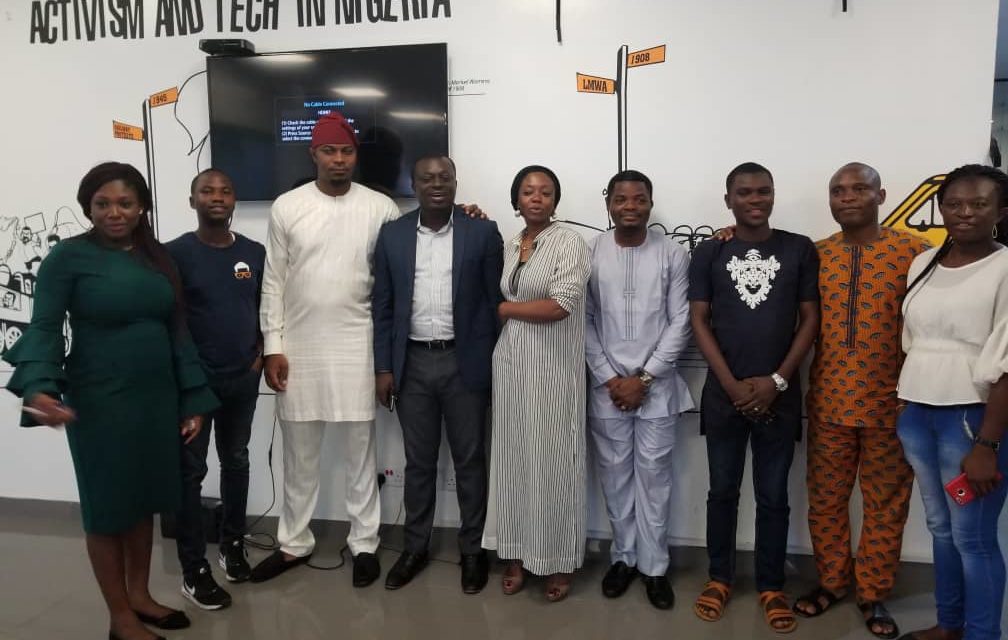Share this post
Stomach Infrastructure Ideation

Five Lessons from Civic Hive’s Stomach Infrastructure Ideation
 Stomach infrastructure is a popular term used to describe a politically motivated bribe usually sharing of foodstuff among the grassroots ahead of an upcoming election to vote in specific directions. The word “stomach infrastructure” became popular in Nigeria during the 2014 gubernatorial election poll in Ekiti State, where the incumbent governor, Dr. Kayode Fayemi lost the elections by a wide margin and accused the governor-elect Ayodele Fayose of dwelling mostly on stomach infrastructure instead of focusing on infrastructural development and other people-oriented programs.
Stomach infrastructure is a popular term used to describe a politically motivated bribe usually sharing of foodstuff among the grassroots ahead of an upcoming election to vote in specific directions. The word “stomach infrastructure” became popular in Nigeria during the 2014 gubernatorial election poll in Ekiti State, where the incumbent governor, Dr. Kayode Fayemi lost the elections by a wide margin and accused the governor-elect Ayodele Fayose of dwelling mostly on stomach infrastructure instead of focusing on infrastructural development and other people-oriented programs.
Civic Hive hosts Stomach Infrastructure Ideation on the 29th and 30th June 2018. The theme of the event focused on how to crack grassroots politics in a non-transactional way. The program brought together citizens, thought leaders, and professionals to discuss how to eradicate stomach infrastructure and proffer solutions to this menace used as a tool by politicians to the disadvantaged few.
Votes don’t count much except the powers allow it. Ayisha Osori, author of the famous “Love doesn’t win elections” shared her political experience while running as an aspirant for the post of House of Representatives in 2015. She emphasized the depth of Godfatherism in Nigerian politics and how they are a force to reckon with when it comes to who emerges as a party political candidate. According to her, this is the primary cause of non-visionary leaders who will resolve to instant gratification to buy off the people’s vote.
“You can’t promise a hungry man tomorrow when there is no guarantee of today.” Yomi Fawehinmi, a renowned Professor, Lecturer, and Human Resources consultant. He has a vast knowledge of public ideologies, and citizenry obsession with material things in exchange for their votes made him a top pick as our speaker for the event. He believes the problem of transactional politics became widespread in poverty in the country. According to him, we can have both stomach infrastructure and also have infrastructural development, reiterating this, he said: “You can’t promise a hungry man tomorrow when there is no guarantee of today.” He believes there must be a balance between both sides.
The third panelist, Gbadebo Rhodes-Vivour, a graduate of MIT, is a public policy expert, activist, and architect, he has a deep root with local communities in Lagos, Nigeria, which made him aspire for the position of the chairman of Ikeja, which is one of the most significant Local Government areas in Lagos. Gbadebo’s experience with the grassroots in his locality, their needs, and him being a strong advocate of ending stomach infrastructure, he extensively discussed the depth of stomach infrastructure in urban areas and how easily politicians penetrate the grassroots due to their affluence. He established the in-depth of poverty that has normalized the mindsets of Electorates to demand money and gifts to vote towards a particular direction.
Sell the dream of our Ideal Nigeria to Everyone- Ayisha said we must begin to preach the idea of our dream Nigeria to citizens, help them picture what it looks like and what they must do to achieve this. She emphasized the importance of intentional investment in human capital development, Ayisha said: “We have a population of young and unproductive people, if properly harnessed, stomach infrastructure can no longer be in existence.”
Leadership is about service, not a quick means to amass wealth: Yomi Fawehinmi reiterated that governance is about service and you do not need to join a political party to serve your community. It is crucial we make political offices less attractive by reducing their overall earnings and cutting the bloated overhead costs which make political offices highly sought. He also emphasized the importance of having an influence strategy to win the people over, he said, “’ Have a strategy to influence people and explore the strategy consistently” Most importantly, we must work to stop the rigging of elections and ensure to hold free and fair elections.
Reform and Disruption: These are the two groups with different opinions about transactional politics in Nigeria. The Reform group believes it is impossible to end stomach infrastructure; however, we can run it alongside physical developments for the people. The Disruption group thinks the idea of stomach infrastructure should be eradicated as it promotes generational poverty and halts growth. The two groups identified their context; trade-offs, a pathway to service and politics, group messaging, defined channels, and impact measurement.
We will continue to drive these discussions ahead of the 2019 general elections. Kindly join the conversation, share your thoughts or ideas on stomach infrastructure in Nigeria.